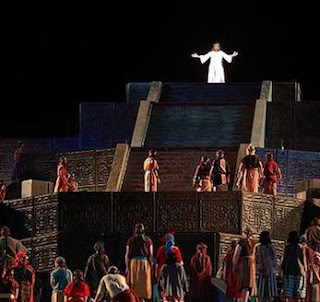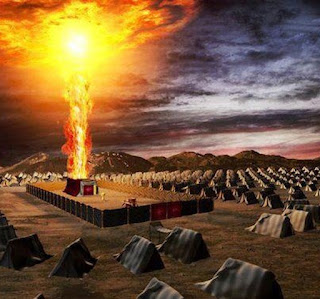The Lost 116 Pages - What We Think Was On There And What People Said Was On There!
There are loads of interesting aspects to Church history. For example, did anyone else use seer stones? You could ponder that all day - or the times Church members used priesthood to cease storms - that doesn't get talked about enough. And then, of course, there is the persistent wondering of whether or not LDS prophets still see Christ (most have!). Again, these are just a few random Church-related points worth rabbit-holing.
Without
a doubt, the lost 116 pages from the Book of Mormon deserves a place on that list. What was on them? Do they still exist? Could
charred but legible chunks of them still be lining a 19th century
fire pit?
For
those who don’t know, these 116 pages were the first portion of the Book of
Mormon - translated with Martin Harris acting as scribe. Harris really wanted to
show his wife what he was working on. He asked to borrow the 116, was divinely told no
twice - but then a third time he was finally granted permission with severe
restrictions on to whom he could show the pages. Martin, overjoyed, took the huge
sheets of paper, probably skipped out to his wagon while whistling a tune and hiyah-ed his horses a loooonnnngggg way home.
Those
116 pages disappeared. Nobody is sure where they went or who took them. Thought
of their content can be captivating.
There
are two ways to ‘know’ what was on those pages. The first is to find passages in the
Book of Mormon that seem to reference an earlier known event – like in Alma10:2:
2 I am Amulek; I am the son of
Giddonah, who was the son of Ishmael, who was a descendant of Aminadi; and it
was that same Aminadi who interpreted the writing which
was upon the wall of the temple, which was written by the finger of God.
Aminadi
interpreted what now? You get it though. That story was probably fleshed out in
the lost 116. Mormon wouldn’t leave us hanging like that. This type of 116
guessing is easy, abundant, and a little disappointing when reading a list of
what was on those pages because it’s not the second way.
The
second way to know what was on there is a little more exciting. It is people
telling us what was on those pages because they remembered some of the stories.
This is what makes a more fulfilling 116 lost-list. We have both types for you
today – four of each. We’ll start with the first type:
Type
1 – the logical conclusions:
Nephi
paraphrased from his father’s record. Those segments can tell us what was in
Lehi’s own book:
1)
Nephi borrowed straight from the Book of Lehi. A lot:
“…the following segments of 1
Nephi paraphrase Lehi’s record: Lehi’s two visions at the time of his call (see
1 Nephi 1:4–15), his departure into the desert (see 1 Nephi 2:1–10, 14–15),
parts of Lehi’s vision of the tree of life (see 1 Nephi 8:30–33; 8:35–9:1), his
prophecies concerning Israel and the Messiah (see 1 Nephi 10:1–16), and the
desert itinerary (see 1 Nephi 16:11–17, 33; 17:1–6). There are others shorter
in length which almost all appear in 1 Nephi: Lehi’s prophecies and subsequent rejection
in Jerusalem (see 1 Nephi 1:18–20), his prophecies regarding the brass plates
(see 1 Nephi 5:17–19), Lehi sending for Ishmael and his family (see 1 Nephi
7:1–2), Nephi’s interpretation of Lehi’s words concerning Israel’s destiny (see
1 Nephi 15:17–18), the Lord’s command to Lehi to move on and the accompanying
discovery of the compass (see 1 Nephi 16:9– 10), and the revelation to Lehi by
means of the compass (see 1 Nephi 16:25–27). (https://rsc.byu.edu/archived/book-mormon-treasury/recovering-missing-record-lehi)
This next one tells us, pretty
precisely, specific chapters that were on those pages:
2)
The first two
chapters of Mosiah are missing:
“Royal Skousen, a BYU professor of linguistics and the editor of
the monumental Book of Mormon Critical Text Project, said in a phone interview
that our current Mosiah chapter 1 is really just the beginning of Mosiah
chapter 3. Most, if not all of the original first two chapters were stolen
along with "The Book of Lehi."
“"That 116 pages that they had went a little bit further. It
already started into Mosiah. So that was also (stolen)," Skousen said.
“There are several clues that support this theory, Skousen said.
Every other book in the Book of Mormon is named after the first person that is
writing in it. The current Mosiah chapter 1 begins with King Benjamin. But the
book is not called "Benjamin." The "Mosiah" it is named after
is likely Benjamin's father.
“Another indication that the first few chapters of Mosiah are
missing is that, unlike the other books in Mormon's abridgement, there is no
explanatory introduction. "It begins in the middle of things,"
Skousen said.
“The clincher is that the printer's manuscript identified the
first page of Mosiah as "Chapter III" before it was corrected to read
"Chapter I."” (https://www.deseretnews.com/article/705384845/Scholars-Corner-The-stolen-chapters-of-Mosiah.html)
And
here, kind of the opposite of what we just read, is a bit that was translated
and ready to go at the same time as the 116, but it trailed onto a new page and
wasn’t taken with the rest:
3)
We Still Have
Some of the Martin Harris Scribe Sessions:
“[A] revelation given to Joseph after he lost the 116 pages
suggests that some of the original translation may yet be preserved in our
current Book of Mormon. Some scholars, like Jack M. Lyon and Kent R. Minson,
believe they have identified what that retained portion was: Words of
Mormon 1:12–18.1
“The idea behind this theory is that our current version of Mosiah
starts in chapter 3 and Martin Harris lost most of the first two chapters of
Mosiah with the rest of the 116 pages. But part of the original Mosiah 2 may
have survived and mislabeled as part of Words of Mormon.
“This proposal is based on a careful reading of Words of
Mormon, combined with evidence from the printer’s manuscript. One of the
most confusing things about the Words of Mormon is that it seems to end in the
middle: verse 11 reads, “And I know that [the plates] will be preserved; for
there are great things written upon them, out of which my people and their
brethren shall be judged at the great and last day, according to the word of
God which is written.”
“This would be a perfectly good ending to Words of Mormon, yet it
continues with something seemingly unrelated, “And now, concerning this king
Benjamin—he had somewhat of contentions among his own people.” It then
continues to talk about King Benjamin for the next six verses without coming to
a conclusion.” (https://knowhy.bookofmormoncentral.org/knowhy/what-if-martin-harris-didnt-lose-all-of-the-116-pages)
This
is another example of a logical conclusion of lost-content. When did the
Nephites turn out the lights and lock up for the last time in the Land of
Nephi?
4)
The BOM contains
Lots of partial stories that were probably better explained in the 116 pages –
like the move to Zarahemla:
Type
2 - What people remembered was on the lost 116:
Remember
how Nephi & co were like “Hey Ishamael, how’d about moving to the desert
with us and our renegade-prophet father?” and Ishamael was like “You know what?
That actually sounds pretty great. We’re in!” Well there is a good reason for
Ishmael’s quick acceptance:
1) Lehi’s daughters were already married to Ishamael’s
sons before all the return trips to Jerusalem:
“In fact, we know from one source that the families were not only
acquainted but also related. Elder Erastus Snow explained in a sermon delivered
in May 1882: “The Prophet Joseph informed us that the record of Lehi was
contained on the 116 pages that were first translated and subsequently stolen,
and of which an abridgement is given us in the first Book of Nephi, which is
the record of Nephi individually, he himself being of the lineage of Manasseh;
but that Ishamael was of the lineage of Ephraim, and that his sons married into
Lehi’s family, and Lehi’s sons married Ishamael’s daughters.”
“That is to say, it appears that Ishmael’s sons were already
married to Lehi’s daughters before the journey began.” (Doctrinal Commentary on the Book
of Mormon, McConkie & Millet, P. 53-54)
How
exactly did the Liahona work? We know it required faith, but is that all the
Lehites recorded?
No, it is not!:
2) A more complete description of the Liahona:
“A close associate of Martin Harris actually gave a description of
the Liahona that explains the function of the second spindle. He says if you
were to look at the surface of the Liahona, around the edges you had characters
or pictures or something that indicated different things such as food, water,
other types of provisions, and so on. According to him, the function of the
second spindle was that the second spindle showed you what the first spindle
was pointing you to…
“…If the Liahona was now
pointing you not to the promised land, but where to go for wild game, so you
can eat – and you don’t want to take the whole clan, the whole family, and have
them go up in the mountains to look for game – the Liahona actually tells you
it’s not pointing the way to the promised land. It’s pointing to food so that
the hunters can go and get food.” (http://hwcdn.libsyn.com/p/b/3/0/b3049518f56e4eb3/LDSP_Don_Bradley_Lost_116_Pages.pdf?c_id=18784262&cs_id=18784262&expiration=1562733425&hwt=84699f5c2af611f8bfc845e07206887e)
Here is a bit that may be the best known of all 116 lost-content.
It’s well known because of the work of Don Bradley (see the link after the
excerpt). It contains the most previously unknown and exciting details - like wilderness adventures and ancient temples:
3) The Discovery of the Interpreters and the end
of the Liahona
“Early in 1830 a young man named
Fayette Lapham, visited Joseph Smith, Sr. to learn more about the much rumored but still unpublished Book of Mormon. Lapham would years later publish an account
of their interview that, while occasionally garbled, relates enough inside
information about the finding of the plates to verify that the interview
occurred. After recounting to Lapham the Book of Mormon’s coming forth, Joseph,
Sr. then described Lehi’s journey to the New World and related several of the
book’s other narratives. Lapham’s account details one of these in particular, a
narrative that beautifully embodies the Book of Mormon’s complex use of Exodus
typology and other threads of the Hebrew Bible—namely, the narrative of the
Nephites finding the Jaredite interpreters…”
“… In the story as Lapham recounts
it from Joseph Smith, Sr. is that sometime after the people have arrived in the
New World, they’re traveling and they’re being led by the Liahona. And the
Liahona leads them to this strange object, and the guy who finds it doesn’t
know what it is. So they have a tabernacle, which shows you that they’re in
between temples, which would’ve only been the case either when they first
arrived in the New World and had not yet built a temple or during the exodus
Mosiah led from the Land of Nephi, where they had a temple, to Zarahemla where
they would build a temple. He brings this object into the tabernacle and
immediately the voice of the Lord asks him a question, presumably from behind
the veil covering the Holy of Holies where the Lord’s presence was understood
to dwell. And the voice asks him, “What is that in your hand?” And Lapham says
the man responded that “he did not know but that he had come to inquire” –
those are Lapham’s exact words. So the Lord tells the man to take this object
and put it on his face, and then to cover his face with animal skins. And when
he does, he’s able to see anything supernaturally, it’s the interpreters. At
that point the Liahona actually stops working; the Liahona, which led him to
the interpreters, is actually now replaced by the interpreters. This would
explain not only how the Nephites get the interpreters, but also why the
military expeditions in the book of Alma never uses the Liahona for guidance.” (https://www.fairmormon.org/conference/august-2012/piercing-the-veil-temple-worship-in-the-lost-116-pages)
This
one is the newest to me. According to this story, Lucy Harris definitely stole
the pages. She gave them to a local doctor for safe keeping. That doctor would
read them to patients while he was blood letting, carefully measuring
skull-circumference or whatever doctors did back then. One man recorded a bit
of what he remembered from his doctor visits:
4) A description of the mounds…
“William
Hine of Colesville, New York, stated in 1885 that Lucy Harris gave the
manuscript to one of his neighbors, a Dr. Seymour. Hine then remembered that
Dr. Seymour “read most of it [the lost manuscript] to me when my daughter Irene
was born; he read them to his patients about the country. It was a description
of the mounds about the country and similar to the ‘Book of Mormon.’”” (https://rsc.byu.edu/archived/coming-forth-book-mormon/lost-116-pages-story-what-we-do-know-what-we-don-t-know-and-what)
That’s
about it. I haven’t seen other memories of what was on those pages – but there
are definitely others out there. The aforementioned Don Bradley has promised a
book about what was on the 116. It keeps getting pushed back, as I
understand it, because people keep sending him new content.
Do
you know anything else lost from the 116? If so, put it out there! Put it on
here! In the comments! I’d love to see it!
Actually,
there are at least 16 million people that would love to see it!
Please
feed our curiosity!











See JD Grovers Caractors document: https://www.academia.edu/5007828/_The_Caractors_Document_New_Light_on_an_Early_Transcription_of_the_Book_of_Mormon_Characters_Mormon_Historical_Studies_vol._14_No._1
ReplyDeletefor a possible translation of some of the other characters, skip to chapter 12 if you want to know the proposed translation